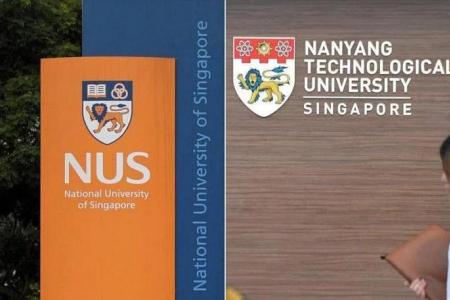NUS and NTU among top 5 Asian universities in Times rankings
The National University of Singapore (NUS) and Nanyang Technological University (NTU) have maintained their positions in the top five in the latest rankings for Asian universities by Times Higher Education.
NUS has held on to its third placing for the fourth consecutive year. NTU has retained its fifth placing since 2021. Both universities have held top 10 positions since 2015.
The top 10 universities in Asia were dominated by those located in China and Hong Kong, with Tsinghua University and Peking University clinching the top two spots for the fourth year in a row.
The University of Hong Kong retained fourth place, while the Chinese University of Hong Kong and The Hong Kong University of Science and Technology were sixth and seventh respectively.
The other universities in the top 10 include The University of Tokyo in eighth place, and two more Chinese universities tied in ninth place (Fudan University and Shanghai Jiao Tong University).
This year’s rankings, which were released on Thursday, comprise 669 universities from 31 countries and regions, up from the 616 ranked in 2022.
Times Higher Education’s Asia University Rankings use the same 13 performance indicators the publication uses for its World University Rankings, although weightings were recalibrated to reflect the priorities of Asian institutions.
For instance, the data for citations – which account for close to one-third of a university’s score – is normalised to reflect variations in citation volume across different subject areas. This is so that universities with high research output in subjects with traditionally high citation counts do not get an unfair advantage, said the publication.
The performance indicators are grouped into five areas: teaching, research, citations, international outlook, and industry income.
Mr Phil Baty, Times Higher Education’s chief global affairs officer, said the rankings reflect a growing influence among Asian universities on the spread of knowledge across the globe.
For instance, citation scores on the continent are growing at a faster pace than the rest of the world. Research coming out of the region in business and economics, computer science, and engineering are particularly highly cited, said the publication.
Commenting on Singapore’s performance in the rankings, Mr Baty said that Singapore has consolidated its position as one of the world’s leading global hubs of research and innovation, despite mounting competition from China and Hong Kong.
“For a city-state with a relatively young higher education and research ecosystem, this is a remarkable achievement and bodes very well for the future,” he added.
NUS told The Straits Times that the post-pandemic global higher education landscape has compelled institutions to re-examine the frameworks in which they operate, with NUS being no exception.
“Going ahead, we will focus on intensifying innovations in university education and lifelong learning to help our students and alumni thrive in the future economy, substantially raising the translational impact of our research, and developing one of the most vibrant and dynamic entrepreneurial ecosystems in the world,” said an NUS spokesman.
NTU told ST that it continues to pursue excellence in education, research and innovation while competing with the world’s top universities. The university is midway through its NTU 2025 strategic plan to nurture greater interdisciplinary collaboration, among other things, noted its spokesman.
“The university is committed to our long-term investments and strategic choices that support our mission to nurture leaders and create societal impact through interdisciplinary education and research,” added the spokesman.
Get The New Paper on your phone with the free TNP app. Download from the Apple App Store or Google Play Store now


